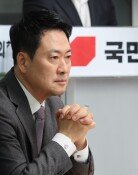Abes Cabinet shows a record low approval rating
Abes Cabinet shows a record low approval rating
Posted June. 24, 2014 06:08,
The approval rating for Japanese Prime Minister Shinzo Abes Cabinet has fallen to a record low since the launch in December 2012. The Japanese Cabinet has tried to verify the Kono Statement in which the Japanese government admitted the forced mobilization of comfort women for Japanese soldiers and sought to have collective self-defense.
In a telephone poll conducted by the Asahi Shimbun, one of Japans leading newspapers, on Saturday and Sunday, the approval rating of Abes Cabinet fell by six percentage points from last month`s 49 percent to the record low of 43 percent. About 33 percent of the respondents said that they do not support Abes Cabinet.
When it was launched in December 2012, the approval rating was hovering around 60 percent. However, it fell to 46 percent immediately after a special state secrets bill, which stirred controversy over the right to know, passed the Diet in December last year. Its lowest approval rating was 46 percent in the past, but it hit another record low this time.
The number of respondents who opposed tolerating collective self-defense (56 percent) was double the number of those who were in favor of it (28 percent.) Some 67 percent of the respondents said it is inappropriate to tolerate collective self-defense by changing the interpretation of the constitution, not by revising the constitution, which is much higher than those who said it is appropriate (17 percent). About 76 percent of the respondents said sufficient discussions were not made on collective self-defense.
In the opinion poll conducted by Japans Kyodo News agency for the same period of time, the approval rating of Abes Cabinet fell by 2.6 percentage points from last month to 52.1 percent. More people opposed tolerating collective self-defense than those who were in favor of it (34.5 percent).
As the Asahi Shimbun and the Kyodo News agency did not survey the review result of the Kono Statement, it is not sure what the Japanese public think on the matter. Unlike collective self-defense and the special state secret bill, however, the Japanese people are said to be divided over the Kono statement issue. Japanese journalists say, Ordinary Japanese people mostly feel that there were many exchanges of views between Korea and Japan.
Some people outside Japan express concerns over the review of the Kono Statement. Mindy Kotler, director of Asia Policy Point, a Washington-based think-tank, said on Sunday that what the Japanese government released on the review result of the Kono Statement is childish as it tries to resist the U.S. (which stresses honoring the Kono Statement). She also said that the Abe administration wanted to say "no" to Washington, and the purpose of the review was to plant the seeds of doubts on the history of comfort women for Japanese soldiers, adding that it is wrong to give a negative impression to what Seoul and Tokyo negotiated over the comfort women issue.
She added that the comfort women issue is not only related to Korea but also to all other countries such as China, Indonesia, the Philippines, the Netherlands, the U.K., Australia, and France, and the related governments need to make it clear that the Abe administrations perspective is regressive and unconvincing.




![“잠만 자면 입이 바싹바싹”…잠들기 전에 이것 체크해야 [알쓸톡]](https://dimg.donga.com/c/138/175/90/1/wps/NEWS/IMAGE/2026/02/23/133404749.3.jpg)


